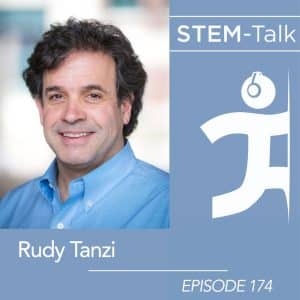STEM-Talk: Rudy Tanzi on genetics, aging, and the hallmarks of Alzheimer’s
Published 10.28.24
Dr. Rudy Tanzi is best known for co-discovering all three familial early onset Alzheimer’s genes — discoveries that have expanded what we know about the disease, how we might counter its effects, and the speed with which drug therapies can be brought to market.
He has co-written two books with Deepak Chopra, , “Super Brain” and “The Healing Self,” and is one of the top 50 most cited neuroscientists in the world. He also plays keyboards in the studio for Aerosmith and its guitar player Joe Perry.
A well-rounded career to be certain.
Tanzi is the director of the Genetics and Aging Research Unit as well as the director of the Henry and Allison McCance Center for Brain Health. He is also co-Director of the Massachusetts General Institute for Neurodegenerative Disease at Massachusetts General Hospital and serves as the Joseph P. and Rose F. Kennedy Professor of Neurology at Harvard Medical School.
He shares his expertise on this episode of STEM-Talk, available now wherever you listen to podcasts. It’s a fascinating conversation with someone who is a world-renowned expert in Alzheimer’s Disease.
“If you ask what leads to cognitive decline with age, or in a more serious way, what determines the degree of dementia once Alzheimer’s Disease begins, the answer is the same – the loss of synapses,” Tanzi says. “Inevitably as you age, synapses get lost. It’s our job to build synaptic reserves, like reserves in a bank, because the more synapses you make, the more you can lose before you get into trouble. The way you build synapses is simple: You learn new things.”
Listeners will learn many things in this episode including:
- How Tanzi’s childhood love of music — and a Jimmy Smith jazz album from his father — led from playing the accordion to playing the Hammond B3 organ. His father then asked if Tanzi would rather play the accordion or a Hammond B3 organ? “This is the same type of organ I was hearing in all the bands I was listening to like Yes and Sanatana and others. So, I said, yeah, I think I want to play the organ.”
- How his family’s medical transcription business fed his early science interest and led him to entering the Westinghouse Science Talent Search as a teen.
- How his project for the Westinghouse Science Talent Search on diabetic hypertensive retinopathy still influences his work today.
- His work with Jim Gusella in the early 1980’s at Mass General where they were the first group to discover a specific disease gene linked to Huntington’s disease.
- His discovery of the first Alzheimer’s gene, APP, which causes the production of amyloid and can cause a rare form of early onset Alzheimer’s.
- The lifestyle factors that play into whether someone who is predisposed to develop Alzheimer’s can stave off or completely avoid disease development. “Neuroinflammation is the biggest killer of nerve lines and synapses in the brain,” Tanzi says. “As we age, inflammation becomes more and more rampant throughout the body….Your lifestyle, the amount of sleep you get, the quality of your diet and exercise, all of these things affect the rate of neuroinflammation in your brain.”
IHMC is a not-for-profit research institute of the Florida University System where researchers pioneer science and technology aimed at leveraging and extending human capabilities. IHMC researchers and staff collaborate extensively with the government, industry and academia to help develop breakthrough technologies. IHMC research partners have included: DARPA, the National Science Foundation, NASA, Army, Navy, Air Force, National Institutes of Health, IBM, Microsoft, Honda, Boeing, Lockheed, and many others.
Latest News
- STEM-Talk: Pascal Lee on returning to the Moon — and heading to Mars
- Aging Symposium draws experts to IHMC
- IHMC hosts Fredric G. Levin Lung Care Symposium March 27-28 in Pensacola
- Humanoid robotics and exoskeletons lead latest IHMC newsletter
- Celebrate Robotics Week at IHMC Open House on April 11, 2025
- Registration open for 2025 Summer Robotics Camp
- STEM-Talk: JP Errico on vagus-nerve stimulation, inflammation and chronic disease management
- STEM-Talk: Karl Herrup on shortcomings of Alzheimer’s research
- Pensacola attorney joins IHMC Board of Directors


